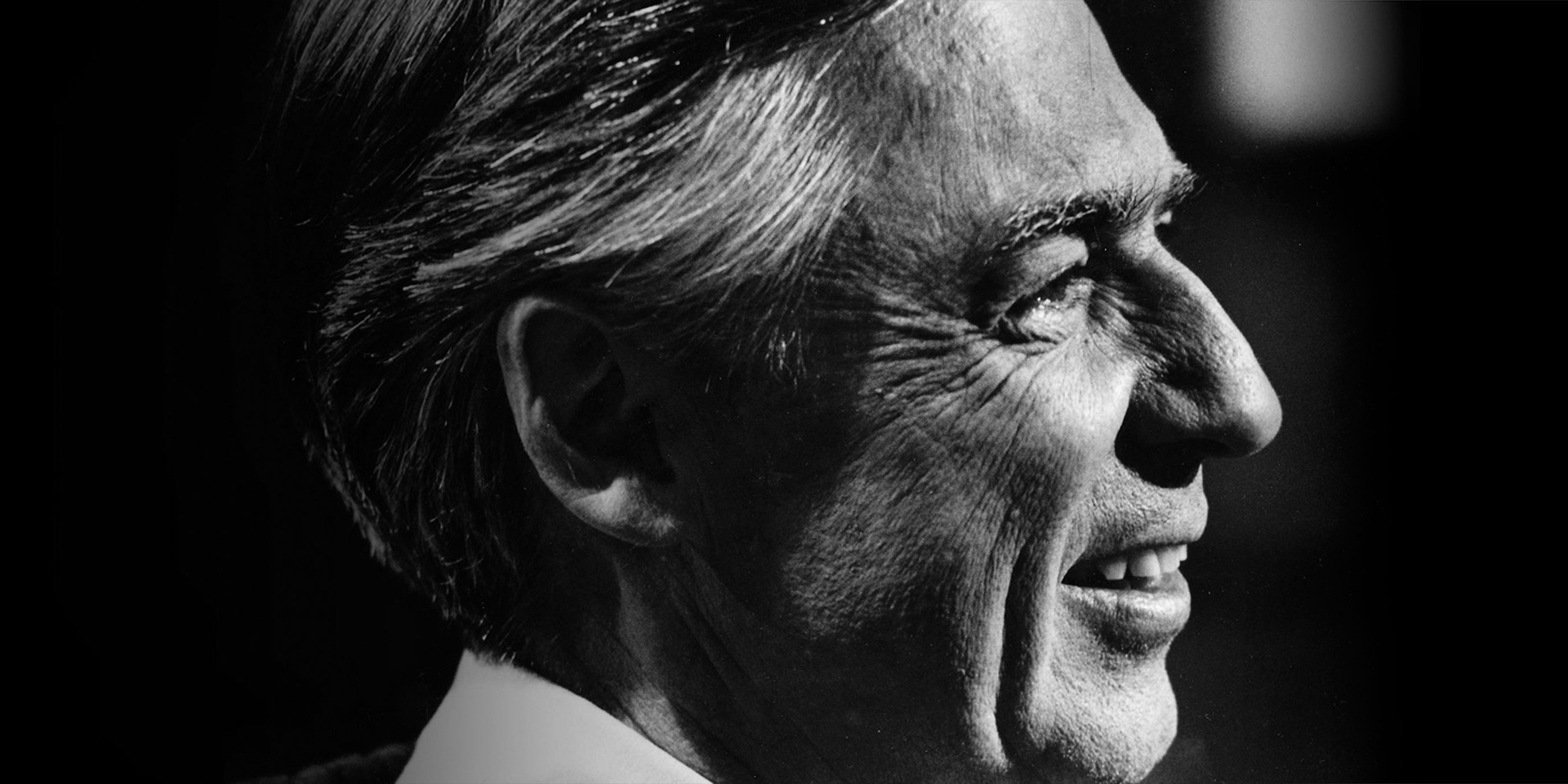Sartre may have been right when he said Hell is other people. Yet, for some, their first step toward Heaven is meeting the God who shelters in someone else’s soul.
It is no overstatement to say that, in the United States, Fred Rogers—the producer of the preschoolers’ show “Mister Rogers’ Neighborhood”—is an icon.
Ten seconds of silence
“Because you have given children self-confidence, generation after generation, because you have been their friend, because you told them, again and again, that they are special and valuable, I am honored to hand over this award for your entire activity, on behalf of the millions of children whose mornings have shone brighter because of your kindness,” said the host of the 1997 Emmy Awards to Fred Rogers. Then, in front of hundreds of guests, Fred Rogers showed the same meekness and humility he had become known for: “Please take ten seconds to think about the people who played an important role in your lives. Just ten seconds to think about the ones that changed your destinies. I’ll mind the watch”, said “Mr. Rogers” as he would be called after the show. When the ten seconds were over, Rogers went on: “Now imagine how happy they would be if they knew how important they were to you.” In total silence, the room resounds with only Mr. Rogers’ peaceful voice, who, after thanking his colleagues, closes his speech with the same gentle tone: “God be with you! Thank you very much!”
If a nationwide broadcast today invited Americans to take ten seconds to think about the most influential people in their lives, hundreds of thousands, perhaps millions of Americans belonging to every social category would dedicate some time to Mr. Rogers. And the main reason would be so simple as to be understood in any corner of this world: he was a man who breathed kindness.
More than half a century after the debut of “Mister Rogers’ Neighborhood”, and 16 years after Rogers’ death, Tom Hanks has revived Fred Rogers on the big screen in the movie, A Beautiful Day in the Neighborhood. At the Toronto Film Festival, which took place at the beginning of September 2019, Hanks said he was absolutely sure the whole world is in dire need of the philosophy which guided Fred Rogers. In Hanks’ view, unfortunately, “cynicism has become the pre-established position we take in most of our daily structures and interactions.” The actor went even further with his social autopsy, saying that “cynicism is a good-to-sell product and looks like the perfect start for the examination of anything”. Hanks thinks Fred Rogers’ show radically opposed this philosophy: “He saw that children’s programs were cynical and why would you show a two or three year old something cynical? Why would you tell him he is not cool because he does not have some kind of toy? Or that it’s funny when someone gets hit in the head with a hammer?” Compared to commercials for expensive toys, and Tom and Jerry cartoons, whose violence is shocking when viewed through adult eyes, Fred Rogers’ shows were an oasis of security, and full of a wholesomeness and goodness worthy of being shared with others.
I like you for how you are
Rogers, who was a Presbyterian pastor, talked in his shows about sensitive matters, hard to approach even for adults, which he carefully conveyed to children. Racism, divorce, death, friendship, solidarity, and service are just a few of the tough topics Fred Rogers explained, through small sketches, on his show. In one of his iconic episodes, Rogers and a black character on the show, Officer Clemmons, cooled their feet together on a hot day. In another one, he invited a boy confined to a wheelchair to sing with him. The lyrics of the song went:
“I like you for who you are, in your heart. Not the things you wear, not the way you do your hair, nor for your fancy chair – they’re just beside you. I like you for who you are.”
Years later, the same boy in the wheelchair, now an adult, gave a television award to Fred Rogers, telling him how much he meant to millions of children. Even after the September 11 attacks on the World Trade Center in New York, Rogers went out in front of the cameras and, rather than talking about “why terrorists exist”, warmly advised his young audience: “In hard times, look for the helpers.” His message powerfully resonated with adults too, and went down in history as a landmark answer to tragedy—deeply practical, but also deeply spiritual: “We do not have an explanation for the evil happening, but help is always at hand. Let’s focus on it and seek it.”
Rogers himself was a help to many. He would start each morning at 5:30, reading, writing and praying for a whole list of people, compiled as he received letters from parents asking him to remind God of their children.
The milk of human kindness
Fred Rogers had his critics. Some reproached him for the fact that his messages, meant to build up self-confidence in his young audience, seemed to have brought about the birth of a generation so self-important, so full of itself, that it feels entitled to a very comfortable existence, devoid of any trials or problems. This is the criticism which, a few years after Rogers’ death, Fox News levelled against him. Some say this was part of an effort by some conservatives, who supported Fox News, to stop the public from financing the PBS network which broadcast Rogers’ show.
But those who knew Rogers personally remain his strongest advocates. The fact that the writer of the movie launched in October 2019 wasn’t able to find even one conflict related to Rogers’ personality, speaks to Rogers’ integrity.
Marielle Heller, the film’s director, told the BBC that Mr. Rogers’ important career might not seem a suitable choice for a film adaptation, for the simple fact that it didn’t have enough “action”. And everybody knows there is no good story without conflict. So the movie placed its bets on something else. It focuses on the relationship between Mr. Rogers and Esquire journalist Tom Junod, who had to write a profile of Rogers in 1998.
Today, Junod is a world-renowned journalist and essayist. A fine observer of human emotions and a story-teller par excellence, Junod is the author of the essay-turned-historical-monument “The Falling Man”, about the anonymous man photographed as he was free-falling from the World Trade Center after a passenger plane had plowed into it on 9/11. However, when interviewing Fred Rogers, not only was Junod not as famous as he is today, but he had exactly the kind of cynical personality Tom Hanks was referring to. The movie follows the inner conflict experienced by the cynical journalist who is meeting a man who is as warm as “the milk of human kindness”. This testifies to the fact that people cannot remain indifferent when they have an encounter with kindness.
Is ‘hero’ too strong a word?
In the essay resulting from this meeting, “Can you say…Hero?”, Junod creates a collage of several meetings Fred Rogers had with children. One of these meetings was a visit Rogers paid to a boy suffering from cerebral palsy. Junod said about this that “when he was still a little boy, some of the people taking care of him, instead of protecting him, abused him and did things to him that convinced him he must have been a really bad boy, since only a bad boy would be forced to go through the things he had to experience.” So the boy turned into a teenager who was depressed and violent to himself. His mother said he used to hit himself, with clenched fists, and that he kept sending just one message through the computer helping him speak: “I no longer want to live”, convinced that God Himself did not approve of what was in his soul.
The story of this boy reached Fred Rogers, who offered to pay him a visit. That day, the boy was so emotional at the thought of seeing Mr. Rogers that, when the TV-host walked into the house, the boy started hitting himself even harder. His mother brought him to another room where she tried to calm him down. When they came back, Mr. Rogers asked him something: “I would like to ask you to do me a favor. Would you like to help me?” The boy answered “yes”, in his computer voice, he would do “anything” for Mr. Rogers. Then the TV-host told him: “I would like you to pray for me. Will you do that?” The boy was astounded by this request. He, who was always the object of prayers, was now being asked to pray for somebody, and not for just anyone, but for Mr. Rogers himself.
“So, although he did not yet know if he could do that, he said he’d try and from then on he kept praying for Mr. Rogers and he no longer spoke about death, because he thought that Mr. Rogers is close to God and, if Mr. Rogers likes him, that must mean God likes him too.”
Junod, who heard the story firsthand from Mr. Rogers, initially praised him for the wisdom of his request: “He knew that, if he asked the boy to pray, it would help him regain his self-esteem.” Rogers, however, firmly rejected such a strategy: “Heaven forbid, Tom! I did not ask him to pray for his sake. I asked him to pray for me. I asked him to do this because I believe that anybody who has gone through the challenges he’s been through must be very close to God. I asked him because I wanted him to intercede for me.”
Less information, more wonder
Rogers’ relationship with his young audience was fascinating, out of this world. Like the time when Rogers, forced by the New York rain, and lacking an umbrella with no cab in sight, took the metro to a meeting he had with Junod. An entire compartment, children and adults, white people, Hispanic people, and black people, sang “Won’t You Be My Neighbor?” (the theme song of Rogers’ show) to him with all their hearts. It must have been magical to hear. Junod was certainly impressed by the image of those strangers who, as Rogers would later tell him, did not get physically close to him or assault him like fans usually do with pop stars, but rather, simply burst into song.
At this point in the article the reason for this detailed portrait of a man who never set foot in our country should become obvious. In the figure of Rogers, who was alive up until only recently, one can easily see a reflection of Christ. Christ, who radiated kindness and humility. Christ, who had a comforting word for the sorrowful, and kind words for the children who loved to play in his presence. Christ, whose return will make people burst into song.
For the man of the present, caught in the materialism and chaos which have become the new normal, the image of the Son of God simply loving people is more easily associated with a pathological portrait of the leader of some cult. Hundreds of “motivational speakers” invade the public space with third-hand speeches. But these are in stark contrast to the warm, paternal, comforting figure of Mr. Rogers, who—inspired by Christ—lives out love, acceptance, and encouragement, and whose lips have never expressed any imprudence.
When faced with a man who is like us, but who seems to breathe a totally different air, a man with irreproachable integrity, a man with an altruistic mission, a man with love for the people, we witness a living revelation of God. Why? Because all of these attributes are associated with God, and they have convinced all, over many centuries, that God is a good God[1].
Millard J. Erickson wrote in his systematic theology treaty that “we are dealing with a good God, One that can be trusted and loved”. Erickson divided God’s moral attributes into purity (embodied in holiness, righteousness and justice), integrity (expressed through authenticity, honesty and faithfulness), and love (manifested through kindness, grace and mercy). All these attributes would be mere words and would sound like chemical formulas in the ears of a preschooler, were it not for people who live them out in their lives. But it is precisely because we find glimmers of these attributes in the people near to us, people like us, that we get a glimpse of The Unseen One. This is a revelation which we as a society must fight to defend. When we lose our ability to see God in others, we limit our own knowledge of God.
This is not, as it might seem for those of us who are extremely zealous, a form of idolatry. For the Bible itself invites us, through the words of the beloved apostle John, to cultivate God’s image in others: “No one has ever seen God;” writes John the Evangelist, “but if we love one another, God lives in us and his love is made complete in us.” In other words, yes, as human beings we are limited, fragile, and vulnerable. We are born with damning infirmities compared to God’s original plan for man: we are not able to see with our physical eyes, nor hear with our physical ears, the One who gave us life. We are isolated in our world, which suffocates on account of longing for eternal life, but which is unable to add even one single breath to life on its own. Despite all this, we—the limited ones—are able to see God when we love. No one has ever seen God, but, if we love, we have already seen Him.
Love means vulnerability
We can never love people too much. Anyone who says otherwise is in fact verbalising an obscure fear. Those who seek to prevent an excess of love cause an excess of suffering. But fear of love being one-sided is, in the end, a normal fear. The ones who love will inevitably get hurt.
The apologist C.S. Lewis put this into memorable words: “To love at all is to be vulnerable. Love anything and your heart will be wrung and possibly broken. If you want to make sure of keeping it intact you must give it to no one, not even an animal. Wrap it carefully round with hobbies and little luxuries; avoid all entanglements. Lock it up safe in the casket or coffin of your selfishness. But in that casket, safe, dark, motionless, airless, it will change. It will not be broken; it will become unbreakable, impenetrable, irredeemable. To love is to be vulnerable.”[2]
Love exposes our hearts to misunderstanding, rejection, betrayal, sickness, and death. And try as we might to avoid them, even if, to some degree, we sometimes manage to do so, we are never sheltered. But it is not a justified fear. In spite of suffering, love is worth it, and it sometimes manifests in the helpless witness of someone else’s suffering. God never loved the world more than when He helplessly witnessed His own son’s suffering as He died for us on the cross.
Alina Kartman is a senior editor at ST Network and Semnele timpului.



















